| Pages:
1
..
27
28
29
30
31
..
40 |
uzaymaymunu
Harmless

Posts: 34
Registered: 26-2-2012
Location: turkey
Member Is Offline
Mood: No Mood
|
|
My little birthday party  Burning mix: sugar rocket fuel, mg powder and KClO3 Burning mix: sugar rocket fuel, mg powder and KClO3

And Ferrofluid
<img src="https://fbcdn-sphotos-c-a.akamaihd.net/hphotos-ak-ash3/544806_10150706157984024_2108355769_n.jpg" width="800" />
[Edited on 22-1-2013 by uzaymaymunu]
<!-- bfesser_edit_tag -->[<a href="u2u.php?action=send&username=bfesser">bfesser</a>: reduced
image width]
[Edited on 7/7/13 by bfesser]
uzaymaymunu.blogspot.com
|
|
|
Mailinmypocket
International Hazard
    
Posts: 1351
Registered: 12-5-2011
Member Is Offline
Mood: No Mood
|
|
Quote: Originally posted by uzaymaymunu  | My little birthday party  Burning mix: sugar rocket fuel, mg powder and KClO3 Burning mix: sugar rocket fuel, mg powder and KClO3

And Ferrofluid
<img src="https://fbcdn-sphotos-c-a.akamaihd.net/hphotos-ak-ash3/544806_10150706157984024_2108355769_n.jpg" width="800" />
[Edited on 22-1-2013 by uzaymaymunu] |
Wow! The awesome smell of burnt sugar must have permeated your house!
<!-- bfesser_edit_tag -->[<a href="u2u.php?action=send&username=bfesser">bfesser</a>: reduced
image width]
[Edited on 7/7/13 by bfesser]
|
|
|
Valentine
Harmless

Posts: 22
Registered: 1-1-2013
Location: Europe
Member Is Offline
Mood: No Mood
|
|
<img src="http://i48.tinypic.com/28s7ijc.jpg" alt="lucigenin" title="Lucigenin" />
Crystals of some freshly prepared lucigenin
(10,10'-Dimethyl-9,9'-biacridinium dinitrate)
|
|
|
Boffis
International Hazard
    
Posts: 1879
Registered: 1-5-2011
Member Is Offline
Mood: No Mood
|
|
@ Valentine
Nice crop of crystals. Would you post details of your synthesis or at least a reference please?
|
|
|
Mailinmypocket
International Hazard
    
Posts: 1351
Registered: 12-5-2011
Member Is Offline
Mood: No Mood
|
|
A molybdenum compound in formation
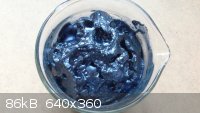 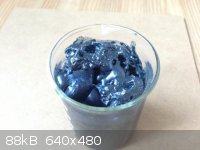
[Edited on 26-1-2013 by Mailinmypocket]
|
|
|
Morgan
International Hazard
    
Posts: 1705
Registered: 28-12-2010
Member Is Offline
Mood: No Mood
|
|
There's a small plastic-coated disc magnet the spark skirts over to reach ground, thus the segmented spark. A 10 foot piece of gray pvc purchased for
under 2 dollars was cut to a 6 foot length. A paper towel was sleeved over the tubing, charging the fruit. This evolved from first testing fruit as an
electrode atop an empty metal jar.
http://www.youtube.com/watch?v=0HlovqIMGkM
http://www.youtube.com/watch?v=P-NbshIOJmc
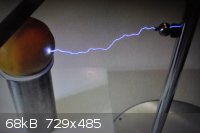 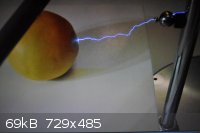 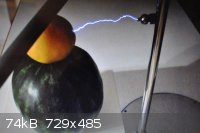
[Edited on 27-1-2013 by Morgan]
|
|
|
Valentine
Harmless

Posts: 22
Registered: 1-1-2013
Location: Europe
Member Is Offline
Mood: No Mood
|
|
Started with anthranilic acid,
1. diazotized then decomposed via Sandmeyer reaction to get o-chlorobenzoic acid (general procedure)
2. Ullmann reaction between aniline and o-chlorobenzoic acid (Organic Syntheses, Coll. Vol. 2, p.15, 1943)
3. Intramolecular condensation of N-phenylanthranilic acid to acridone (Organic Syntheses, Coll. Vol. 2, p.15, 1943)
4. Methylation of acridone with methyl iodide to get N-methylacridone (general procedure)
5. Reductive coupling of N-methylacridone with zinc to get N,N'-dimethyl-9,9'-biacridine
6. Dissolving N,N'-dimethyl-9,9'-biacridine in hot dilute nitric acid, lucigenin crystallizing out on cooling
|
|
|
plastics
Hazard to Others
  
Posts: 141
Registered: 6-11-2009
Member Is Offline
Mood: No Mood
|
|
Synthesis, including intermediates:
http://www.youtube.com/user/chemx01/videos?view=0
Very good youtube site, highly recommended
Quote: Originally posted by Valentine  |
Started with anthranilic acid,
1. diazotized then decomposed via Sandmeyer reaction to get o-chlorobenzoic acid (general procedure)
2. Ullmann reaction between aniline and o-chlorobenzoic acid (Organic Syntheses, Coll. Vol. 2, p.15, 1943)
3. Intramolecular condensation of N-phenylanthranilic acid to acridone (Organic Syntheses, Coll. Vol. 2, p.15, 1943)
4. Methylation of acridone with methyl iodide to get N-methylacridone (general procedure)
5. Reductive coupling of N-methylacridone with zinc to get N,N'-dimethyl-9,9'-biacridine
6. Dissolving N,N'-dimethyl-9,9'-biacridine in hot dilute nitric acid, lucigenin crystallizing out on cooling |
|
|
|
Boffis
International Hazard
    
Posts: 1879
Registered: 1-5-2011
Member Is Offline
Mood: No Mood
|
|
@ Valentine
Thanks for the outline for lucigenin.
I actually did a search online line and found this:
Attachment: Lucigenin preperation JACS 1982.pdf (1.3MB)
This file has been downloaded 836 times
|
|
|
Xenon1898
Harmless

Posts: 49
Registered: 19-1-2013
Location: United States
Member Is Offline
Mood: Researching
|
|
Quote: Originally posted by Valentine  |
<img src="http://i48.tinypic.com/28s7ijc.jpg" alt="lucigenin" title="Lucigenin" />
Crystals of some freshly prepared lucigenin
(10,10'-Dimethyl-9,9'-biacridinium dinitrate)
|
Nice The name of the chemical alone is worth the post! But I love the yellow hue too.
“If we knew what it was we were doing, it would not be called research, would it?”
-Albert Einstein
|
|
|
kristofvagyok
National Hazard
   
Posts: 659
Registered: 6-4-2012
Location: Europe
Member Is Offline
Mood: No Mood
|
|
Have any of you made isocyanides? I just made some and I would say 3 things: it has a really bad odor, it causes a really massive headache what won't
cease from anything and it goes through latex gloves.
-in your body isocyanides isomerize to cyanides, so be smart when working with these 
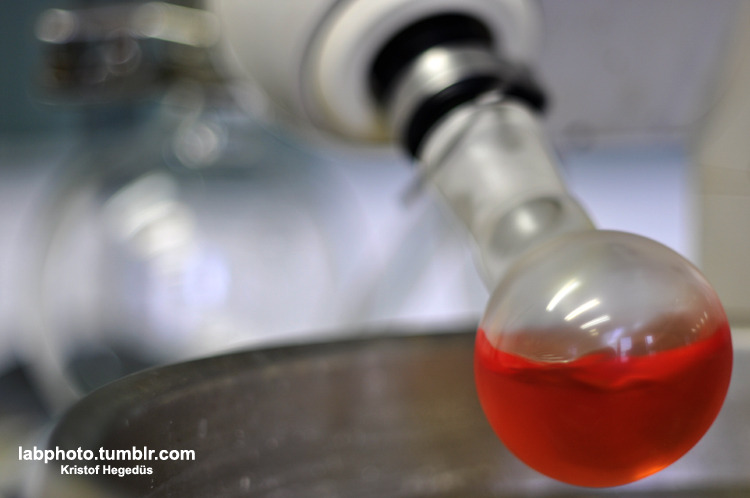
-they are highly UV active and my compound had a really nice color as seen above. Click on the pics and see my other pictures(:
I have a blog where I post my pictures from my work: http://labphoto.tumblr.com/
-Pictures from chemistry, check it out(:
"You can’t become a chemist and expect to live forever." |
|
|
mr.crow
National Hazard
   
Posts: 884
Registered: 9-9-2009
Location: Canada
Member Is Offline
Mood: 0xFF
|
|
Wow! Who would have though something so unpleasant would be so pretty.
Double, double toil and trouble; Fire burn, and caldron bubble
|
|
|
UnintentionalChaos
International Hazard
    
Posts: 1454
Registered: 9-12-2006
Location: Mars
Member Is Offline
Mood: Nucleophilic
|
|
I kinda have my doubts about that (not that nitriles are particularly hazardous in many cases). I would expect hydration to N-alkyl-formamides to be
their primary fate.
[Edited on 2-5-13 by UnintentionalChaos]
Department of Redundancy Department - Now with paperwork!
'In organic synthesis, we call decomposition products "crap", however this is not a IUPAC approved nomenclature.' -Nicodem
|
|
|
Valentine
Harmless

Posts: 22
Registered: 1-1-2013
Location: Europe
Member Is Offline
Mood: No Mood
|
|
 Playing with some lucigenin
Playing with some lucigenin |
|
|
Boffis
International Hazard
    
Posts: 1879
Registered: 1-5-2011
Member Is Offline
Mood: No Mood
|
|
@Valentine
I like than!
|
|
|
kristofvagyok
National Hazard
   
Posts: 659
Registered: 6-4-2012
Location: Europe
Member Is Offline
Mood: No Mood
|
|
Valentine, this pics with lucigenin is simply amazing.
I have just found a few g of it in the lab, I'm going to try out something with it tomorrow(:
I have a blog where I post my pictures from my work: http://labphoto.tumblr.com/
-Pictures from chemistry, check it out(:
"You can’t become a chemist and expect to live forever." |
|
|
BromicAcid
International Hazard
    
Posts: 3254
Registered: 13-7-2003
Location: Wisconsin
Member Is Offline
Mood: Rock n' Roll
|
|
Methyl, butyl, pentyl, methylisocyanoacetate, ethylisocyanoacetate, and 2-napthylisocyanide. They're the types of chemicals where you make the person
running them wear a saranex suit when they come out of the lab to keep the stink inside.
|
|
|
Mailinmypocket
International Hazard
    
Posts: 1351
Registered: 12-5-2011
Member Is Offline
Mood: No Mood
|
|
75g of lead acetate- prepared with lead powder, 80% acetic acid and 35% H2O2 in a reflux setup. It only took about half an hour for the 47.5g of lead
to dissolve completely and it was very exothermic. Now... Time to make a coffee and sweeten it 
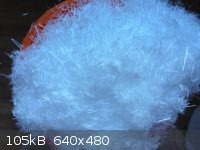
|
|
|
elementcollector1
International Hazard
    
Posts: 2684
Registered: 28-12-2011
Location: The Known Universe
Member Is Offline
Mood: Molten
|
|
It looks so beautiful... and yet must be so deadly.
Elements Collected:52/87
Latest Acquired: Cl
Next in Line: Nd
|
|
|
Adas
National Hazard
   
Posts: 711
Registered: 21-9-2011
Location: Slovakia
Member Is Offline
Mood: Sensitive to shock and friction
|
|
Quote: Originally posted by Mailinmypocket  | 75g of lead acetate- prepared with lead powder, 80% acetic acid and 35% H2O2 in a reflux setup. It only took about half an hour for the 47.5g of lead
to dissolve completely and it was very exothermic. Now... Time to make a coffee and sweeten it 
|
Those crystals are AMAZING  a few weeks ago, I had a dream that I couldn't resist
eating some Pb(OAc)2 a few weeks ago, I had a dream that I couldn't resist
eating some Pb(OAc)2 
Rest In Pieces!
|
|
|
Mailinmypocket
International Hazard
    
Posts: 1351
Registered: 12-5-2011
Member Is Offline
Mood: No Mood
|
|
The key to making the crystals was extremely slow cooling. I put the hot syrupy liquid into an insulated thermos lunchbox, wrapped a towel around the
beaker and sealed up the lunchbox. Even 5 hours later the beaker was still warm but no crystals, only the next morning I found the mass crystallized,
yay!
|
|
|
Boffis
International Hazard
    
Posts: 1879
Registered: 1-5-2011
Member Is Offline
Mood: No Mood
|
|
The barium salts or complexes of alloxan 5 oxime grown under the microscope. Why you sometimes get two distinct compounds forming is not clear they
are both Ba oximates.
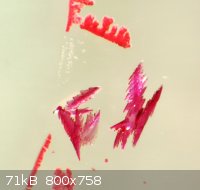
|
|
|
mayko
International Hazard
    
Posts: 1218
Registered: 17-1-2013
Location: Carrboro, NC
Member Is Offline
Mood: anomalous (Euclid class)
|
|
A copper sulfate crystal that grew in one of my beakers. To the right, copper sulfate is combined with ammonium sulfate (white, far right) to form the
ionic salt Cu(NH4)2(SO4)2 , a nice robin's egg blue. This is an example of a Tutton salt, with the general formula [M(II)][M(I)]2(SO4)2, where M are
cations.
To the left, copper sulfate has been complexed with ammonia (far right). The ammonia ligands interact with the copper's d orbitals, causing the color
to change to a deep indigo.
I think it's a neat illustration of the ionic compound being a 'dilution' of color whereas the covalent bonding alters the color.
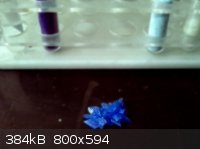
|
|
|
DJF90
International Hazard
    
Posts: 2266
Registered: 15-12-2007
Location: At the bench
Member Is Offline
Mood: No Mood
|
|
@ boffis: The two forms will be polymorphs
|
|
|
Xenon1898
Harmless

Posts: 49
Registered: 19-1-2013
Location: United States
Member Is Offline
Mood: Researching
|
|
Are many people using microscopes?
Quote: Originally posted by mayko  | A copper sulfate crystal that grew in one of my beakers. To the right, copper sulfate is combined with ammonium sulfate (white, far right) to form the
ionic salt Cu(NH4)2(SO4)2 , a nice robin's egg blue. This is an example of a Tutton salt, with the general formula [M(II)][M(I)]2(SO4)2, where M are
cations.
To the left, copper sulfate has been complexed with ammonia (far right). The ammonia ligands interact with the copper's d orbitals, causing the color
to change to a deep indigo.
I think it's a neat illustration of the ionic compound being a 'dilution' of color whereas the covalent bonding alters the color.
|
Good use of a microscope in the lab. I am wondering, do many people find microscopes useful in the home lab? This seems like a great example of a
good use (two pure crystals forming as the same time). Seems like it would be a reasonable investment as an analytic qualitative tool to identify
crystal structure(?)
“If we knew what it was we were doing, it would not be called research, would it?”
-Albert Einstein
|
|
|
| Pages:
1
..
27
28
29
30
31
..
40 |